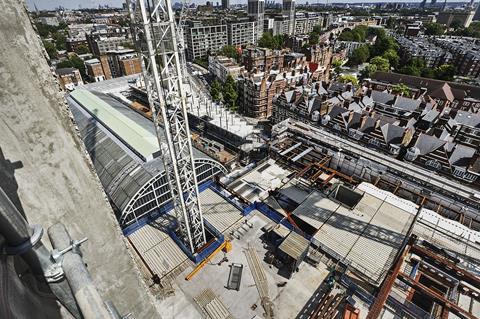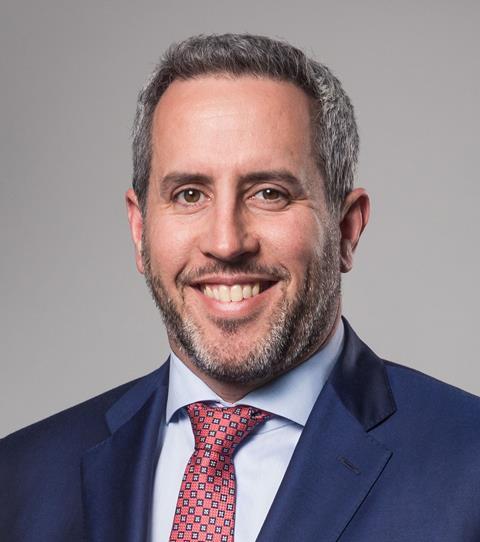Cathal OŌĆÖRourke says contractingŌĆÖs cherished 5% figure can be achieved and warns current industry average ŌĆśis not sustainableŌĆÖ
Laing OŌĆÖRourke edged back into the black last year with new chief executive Cathal OŌĆÖRourke pledging to get the companyŌĆÖs margins closer to 5% in the long run.
In the 12 months to March 2024, the countryŌĆÖs biggest private contractor posted a pre-tax profit of ┬Ż18│Š on ┬Ż4.3▓·▓į turnover, up 19% on last time, after racking up the biggest reverse in its history the year before with a ┬Ż288m pre-tax loss.
OŌĆÖRourke, who succeeded his father Ray as chief executive at the beginning of July after returning from Australia last year as chief operating officer, said average industry margins of between 2.5% and 3% were ŌĆ£not sustainableŌĆØ and added: ŌĆ£This acts as a significant handbrake on the sectorŌĆÖs ability to invest in the transformative technologies that will create step-change.

ŌĆ£The benefits of modern methods of construction can only be fully realised if we also have modern methods of procurement and contracting.ŌĆØ
He said that the firmŌĆÖs business in Australia had managed to turn in margins of 4% and 5% during his time in charge and added that the 5% figure ŌĆō often cited many times in the past by contractors ŌĆō was not a pipedream.
ŌĆ£Finding a way to get a decent return means getting smarter,ŌĆØ he said. ŌĆ£We need to innovate and take costs out of projects.ŌĆØ
The firm has said it wonŌĆÖt bid single-stage, lump sum work and has increasingly moved into negotiated jobs such as frameworks and public sector deals.
But OŌĆÖRourke said it hadnŌĆÖt turned its back on commercial schemes after running into problems on several high-profile jobs in the sector in the past few years. ŌĆ£It depends what the model is. If it sits within our model of direct delivery, we will look at it.ŌĆØ
One of those problem jobs, a ┬Ż600m mixed-use scheme at Olympia is believed to have been resolved although OŌĆÖRourke declined to say whether it had reached an agreement with the client Yoo Capital on costs ŌĆō but added that the pair were ŌĆ£completely aligned to the successful opening of a London iconŌĆØ.
In the accounts, Laing OŌĆÖRourke said its ŌĆ£cash management in FY24 was impacted by significant under valuations and ongoing negotiations on one major contract, which have now been resolvedŌĆØ ŌĆō believed to be a reference to the Olympia job.
Olympia is expected to be finished late next year while the firm has completed work on another London job believed to have been responsible for some of 2023ŌĆÖs losses, the mixed-use scheme at the former Whiteleys shopping centre in Bayswater.
The firmŌĆÖs biggest business, its Europe hub, which also includes work in Canada and the Middle East, posted a pre-tax profit of ┬Ż17m from a ┬Ż168m loss last time on income up 14% to ┬Ż2.5▓·▓į. The firm said that losses on a PFI hospital scheme in Canada, which has seen it ship ┬Ż219m since 2016, remained unchanged for the second year in a row.
But the Europe arm was blighted by ┬Ż26m of exceptional items including ┬Ż5.2m of redundancy costs, which saw 200 jobs cut last year, and ┬Ż19m in provisions to meet defects for fire safety work as required by new government legislation.

OŌĆÖRourke said the firm would consider whether to recoup some of that ┬Ż19m from other firms. ŌĆ£If there are obligations due to us and those firms are still around, we will look at that.ŌĆØ
Revenue from the Australia hub was up a quarter to ┬Ż1.5bn with the firm posting a pre-tax profit of ┬Ż40m from a ┬Ż102m loss last time.
Although not named, a pay dispute with its Japanese partner on a huge gas station job in northern Australia cost it a further ┬Ż6.6m in legal costs taking the amount it has shelled out on lawyersŌĆÖ bills over the bust-up to nearly ┬Ż40m since the dispute began seven years ago.
Signed in 2010, the firm was building four cryogenic tanks at the LNG Tanks Project in Darwin for lead construction partner Kawasaki Heavy Industries before its contract was ended in 2017.
After its year-end, the firm made a ŌĆ£without admissionŌĆØ ┬Ż36m payment to Kawasaki ŌĆ£in respect of the ongoing arbitrationŌĆØ with the dispute finally expected to be resolved in September next year. Another post balance sheet event was the sale of a joinery business in the Middle East for AED25m (┬Ż5m).
The firm is due to finish its job to rebuild Everton stadium later this year and OŌĆÖRourke said he hoped it would ŌĆ£change the narrativeŌĆØ around stadia jobs, which have long been associated with losing money.
Asked if the company would be prepared to look at any rebuild of Manchester UnitedŌĆÖs Old Trafford ground, OŌĆÖRourke, who added the firm had not been approached about potential work, said: ŌĆ£If they came in with the right terms, we could do it.ŌĆØ The club is expected to decide by the end of this year whether to press ahead with a rebuilding scheme or not.
Laing OŌĆÖRourkeŌĆÖs order book stood at ┬Ż10.8bn, ┬Ż800m more than 2023ŌĆÖs figure.
Meanwhile, group chief financial officer Rowan Baker will leave at the end of the month after four years at the business. She is being replaced by her deputy Paul Teasdale who joined OŌĆÖRourke in 2018 from Lendlease. Baker has joined FTSE 250 firm, components manufacturer Essentra.
Ups and downs: Laing OŌĆÖRourke in numbers since 2016
| Year | Pre-tax profit (loss) | Turnover |
|---|---|---|
| 2016 | (┬Ż246│Š) | ┬Ż2.5▓·▓į |
| 2017 | (┬Ż67│Š) | ┬Ż3.2▓·▓į |
| 2018 | (┬Ż44│Š) | ┬Ż2.9▓·▓į |
| 2019 | ┬Ż33│Š | ┬Ż2.8▓·▓į |
| 2020 | ┬Ż46│Š | ┬Ż2.5▓·▓į |
| 2021 | ┬Ż41│Š | ┬Ż2.6▓·▓į |
| 2022 | ┬Ż2.7│Š | ┬Ż3.1▓·▓į |
| 2023 | (┬Ż288│Š) | ┬Ż3.6▓·▓į |
| 2024 | ┬Ż18│Š | ┬Ż4.3▓·▓į |
Laing OŌĆÖRourkeŌĆÖs financial year end is 31 March



























No comments yet